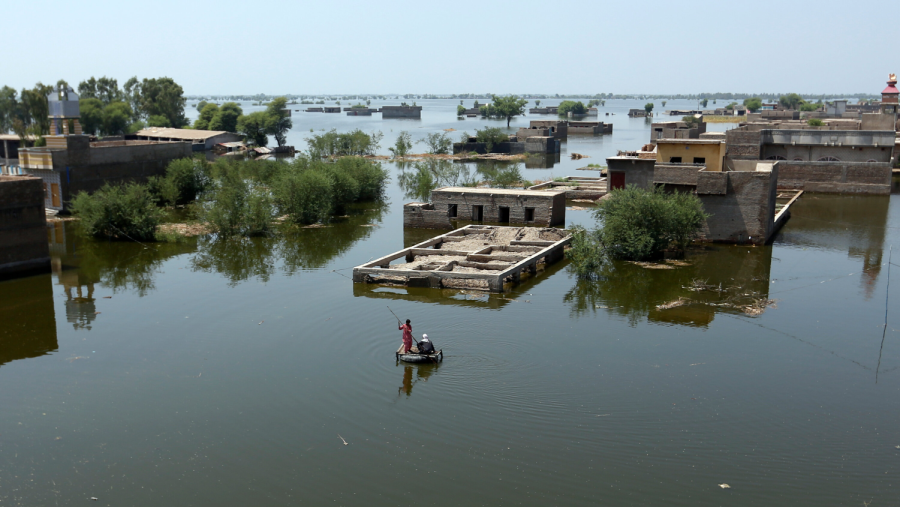Briar Woods’ Perspective on Pakistan Floods and How You Can Help
October 19, 2022
Houses underwater, acres of crops destroyed, refugees fleeing to temporary camps, and thousands dead. These scenes aren’t from a disaster movie, but are instead currently happening in the wealthiest provinces of Pakistan. After violent monsoon rains – who’s intensity was exacerbated by climate change – began in the populous South Asian nation in mid-June, massive flooding has killed thousands and is endangering millions as the wet season continues.
Pakistan is currently suffering immensely, not only because of the countless homes that have been destroyed, causing millions to be displaced, but also because of their heavily damaged agricultural sector that feeds the country. Pakistan’s farming is based largely around river networks and makes up nearly a fifth of the country’s GDP and 42% of its labor force according to the government’s finance division.
Besides mother nature and global warming, many are unsure of who to blame for the scale of devastation. “A lot of people are saying that organizations like the UN should be doing more, that they’re too focused on issues in the West, like in Europe. But still, Pakistan’s government must’ve had some sort of knowledge that a destructive flood was going to hit, but they didn’t prepare a lot,” said an anonymous half-Pakistani Briar Woods student, “It’s a question of who’s fault it is [for the scale of devastation]: Pakistan or the West.”
Regardless of who the blame falls on, countries around the world have the power to help relief efforts in Pakistan. “Infrastructure to harvest, plant, store, and ship crops [have] been decimated,” said social studies teacher Ben Scarboro, “Any time a country experiences a disaster of this magnitude, other countries have the opportunity to help or hinder their recovery. Some countries will work with NGOs [non-governmental organizations] to offer relatively ‘free’ assistance, while other countries may require that Pakistan address environmental, social, or even political conditions before giving aid.”
Though it seems like only governments and large NGOs are able to significantly assist in relief efforts, even Briar Woods students as individuals have the power to make a difference and to try to alleviate the suffering of millions of Pakistanis. “Donating to organizations that supply emergency kits, essential food supplies, and work on rebuilding infrastructures is crucial to helping Pakistan right now. A few trustworthy outlets for flood donations are Islamic Relief, Alkhidmat Foundation, Azaad Pakistan, and Edhi Foundation… the largest volunteer ambulance service in the world… If you aren’t in a position to donate money, sharing information about the crisis to people who are is incredibly helpful,” said the Vice President of the George Mason Pakistani Student Alliance, Alina Alam.
Alam also emphasized the hidden causes of the flooding, saying that “One third of the nation being underwater is the culmination of centuries of colonization, government neglect, and most importantly, climate change. Colonialist exploitation tactics that were previously used in Pakistan for centuries have been continued to be practiced by corrupt government officials, displacing thousands of citizens… through the incorrect use of IMF loans that were originally given to avoid such crises in the first place.”
Even though the issue of the flooding may seem distant to many Briar Woods students, with little media coverage and the fact that the country is over seven thousand miles away, we must remember that there is real and widespread human suffering. Numbers from the New York Times, like 1,500 dead and 33 million displaced, can’t even begin to make us understand what unspeakable tragedies countless Pakistanis are enduring. Scenes of families searching for loved ones in the rubble and children starving in refugee camps are all too commonplace.
Alina Alam’s childhood caretaker is currently suffering from a life-threatening illness called dengue as a result of the flood, all while being seven months pregnant with her child. Briar Woods students have the power to help the people of Pakistan survive, recover, and rebuild. Even those who don’t have money can, at the very least, talk to their friends and family about this tragedy, because, according to Alam, “awareness is an equally helpful form of aid.”


